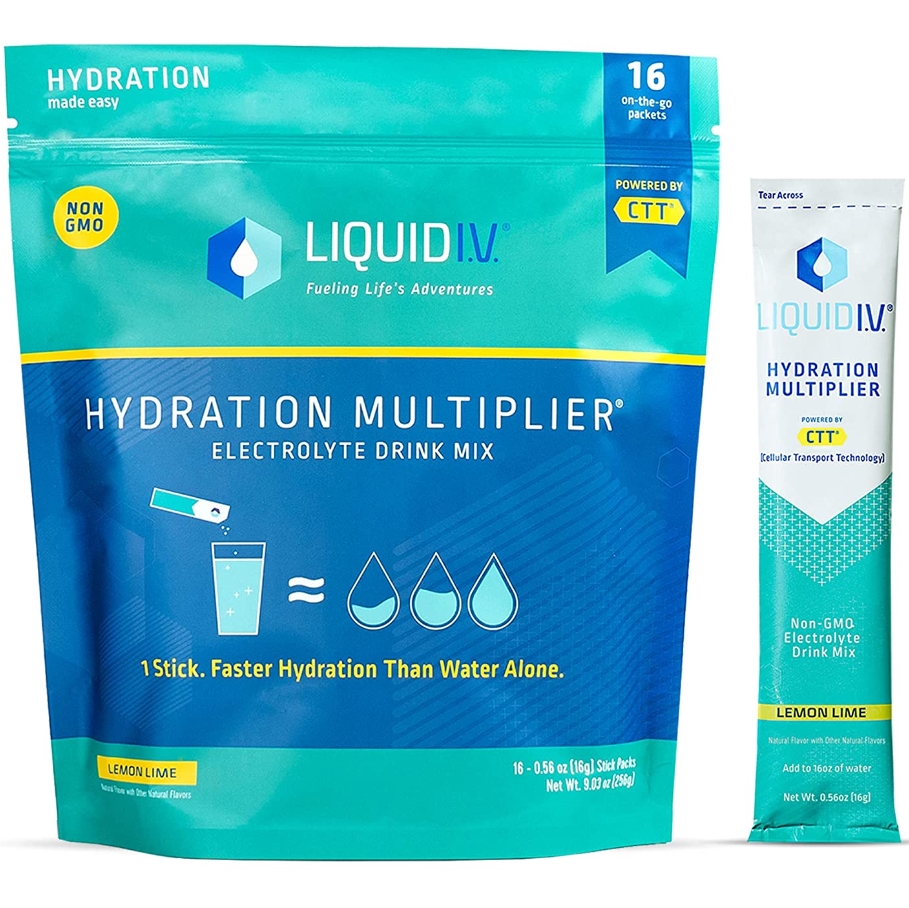
Stevia Leaf Extract
Stevia Leaf Extract is a natural sweetener that comes from the leaves of the Stevia rebaudiana plant. It has a sweet taste but contains zero calories and does not raise blood sugar levels. It is often used as a sugar substitute in food and beverages as a healthier alternative to sugar.
Silicon Dioxide
Silicon Dioxide is a compound made up of silicon and oxygen that is often used as an anti-caking agent in food products. It helps prevent clumping and helps maintain the texture and consistency of powders and other dry ingredients.
Dipotassium Phosphate
Dipotassium Phosphate is a salt made up of phosphorus and potassium. It is commonly used as a food additive to regulate acidity, to enhance the taste and texture of foods, and as a buffering agent to help maintain the pH of processed foods. It is also used as a source of potassium in dietary supplements.
Citric Acid
Citric acid is a weak organic acid that is commonly found in citrus fruits. It is used as a natural preservative and to add a sour or acidic taste to food and beverages. Citric acid also has some health benefits, including helping with the absorption of minerals, promoting skin health, and aiding in digestion.
Vitamin B3
Also known as niacin, vitamin B3 is a water-soluble vitamin that plays a crucial role in the production of energy in the body. It is also important for healthy skin, nervous system, and digestive system. Niacin is found in many foods, including meat, fish, and poultry, and is also available as a supplement.
Vitamin B5
Also known as pantothenic acid, vitamin B5 is a water-soluble vitamin that is essential for the metabolism of carbohydrates, proteins, and fats. It is also important for the production of red blood cells, hormones, and neurotransmitters. Vitamin B5 is found in many foods, including meat, poultry, and whole grains.
Vitamin B6
Also known as pyridoxine, vitamin B6 is a water-soluble vitamin that is involved in over 100 enzymatic reactions in the body. It is important for the metabolism of amino acids, the production of neurotransmitters, and the synthesis of red blood cells. Vitamin B6 is found in many foods, including poultry, fish, and bananas.
Vitamin B12
Also known as cobalamin, vitamin B12 is a water-soluble vitamin that is important for the production of red blood cells, DNA synthesis, and nerve function. Vitamin B12 is primarily found in animal products, such as meat, fish, and dairy, and is also available as a supplement. It is especially important for vegetarians and vegans to supplement with vitamin B12 as they may not get enough from their diet.
Potassium Citrate
Potassium Citrate is a type of potassium salt that is used to regulate the acidity of the blood and urine. It is commonly used to prevent and treat kidney stones by increasing the pH of urine, which reduces the formation of crystals.
Sodium Citrate
Sodium Citrate is a type of sodium salt that is commonly used as a food additive to enhance flavor, as a preservative, and as an acidity regulator. In medical settings, it is used to treat acidosis and to prevent blood clots during and after surgery.
Vitamin C
Also known as ascorbic acid, Vitamin C is a water-soluble vitamin that plays a crucial role in maintaining the health of the immune system, skin, and connective tissues. It is also a powerful antioxidant that helps protect the body against damage from harmful molecules called free radicals. Vitamin C is commonly found in fruits and vegetables, and supplements are often used to prevent and treat scurvy, a disease caused by a deficiency of this vitamin.
Reference
- Abdullah, M., Jamil, R.T. and Attia, F.N. (2020). Vitamin C (Ascorbic Acid). [online] PubMed. Available at: https://pubmed.ncbi.nlm.nih.gov/29763052/.
- Abosamak, N.R. and Gupta, V. (2022). Vitamin B6 (Pyridoxine). [online] PubMed. Available at: https://pubmed.ncbi.nlm.nih.gov/32491368/.
- Arumugam, B., Subramaniam, A. and Alaguraj, P. (2020). Stevia as a Natural sweetener: A Review. Cardiovascular & Hematological Agents in Medicinal Chemistry, 18. doi: https://doi.org/10.2174/1871525718666200207105436.
- Cerullo, G., Parimbelli, M., Perna, S., Pecoraro, M., Liguori, G., Negro, M. and D’Antona, G. (2020). Sodium citrate supplementation: An updated revision and practical recommendations on exercise performance, hydration status, and potential risks. Translational Sports Medicine, 3(6), pp.518–525. doi: https://doi.org/10.1002/tsm2.174.
- Krieger, N.S., Asplin, J.R., Frick, K.K., Granja, I., Culbertson, C.D., Ng, A., Grynpas, M.D. and Bushinsky, D.A. (2015). Effect of Potassium Citrate on Calcium Phosphate Stones in a Model of Hypercalciuria. Journal of the American Society of Nephrology, [online] 26(12), pp.3001–3008. doi: https://doi.org/10.1681/asn.2014121223.
- Makofane, V., Ng’ambi, J.W. and Gunya, B. (2022). The Effect of Citric Acid Supplementation on Growth Performance, Digestibility and Linear Body Measurement of Ross 308 Broiler Chickens: A Review. Indian Journal of Animal Research, (Of). doi: https://doi.org/10.18805/ijar.bf-1433.
- Peechakara, B.V. and Gupta, M. (2023). Vitamin B3. [online] PubMed. Available at: https://pubmed.ncbi.nlm.nih.gov/30252363/.
- Sanvictores, T. and Chauhan, S. (2022). Vitamin B5 (Pantothenic Acid). [online] PubMed. Available at: https://pubmed.ncbi.nlm.nih.gov/33085380/.
- Smith, A.D., Warren, M.J. and Refsum, H. (2018). Vitamin B12. Advances in Food and Nutrition Research, 83, pp.215–279. Doi: https://doi.org/10.1016/bs.afnr.2017.11.005.
- Wu, J., Fu, X., Jiang, Y., Ma, X., Zhang, H. and Zhan, X. (2018). Dipotassium phosphate improves the molecular weight stability of polysialic acid in Escherichia coli K235 culture broth. Bioresource Technology, [online] 247, pp.30–35. doi: https://doi.org/10.1016/j.biortech.2017.08.142.
- Younes, M., Aggett, P., Aguilar, F., Crebelli, R., Dusemund, B., Filipič, M., Frutos, M.J., Galtier, P., Gott, D., Gundert‐Remy, U., Kuhnle, G.G., Leblanc, J., Lillegaard, I.T., Moldeus, P., Mortensen, A., Oskarsson, A., Stankovic, I., Waalkens‐Berendsen, I., Woutersen, R.A. and Wright, M. (2018). Re‐evaluation of silicon dioxide (E 551) as a food additive. EFSA Journal, 16(1). doi: https://doi.org/10.2903/j.efsa.2018.5088.
Next, check out some similar articles you might find interesting:

Leave a Reply